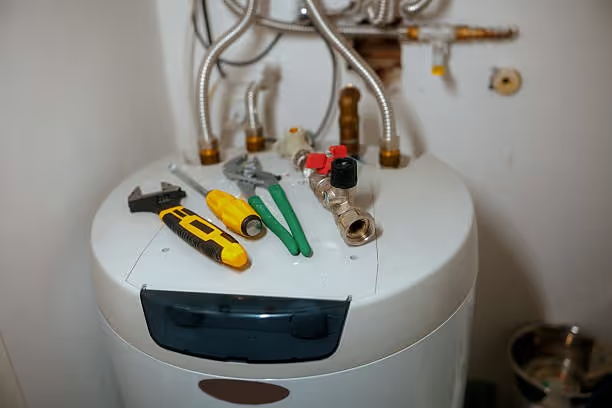Professional Water Heater Replacement in Fort McDowell, AZ
Access to reliable hot water is a fundamental part of modern comfort and daily life. When your water heater begins to fail, it can disrupt everything from your morning shower to your evening chores. For homeowners in Fort McDowell, dealing with a malfunctioning or obsolete water heater requires a swift, professional solution. A replacement is not just about restoring hot water; it’s an opportunity to upgrade your home’s efficiency, performance, and long-term reliability. Our dedicated service ensures your new water heater is selected, installed, and configured correctly for optimal performance and longevity.

Is It Time for a New Water Heater? Key Warning Signs
Before a complete breakdown occurs, most water heaters provide clear signals that their service life is nearing its end. Recognizing these signs early can help you avoid the inconvenience of a sudden loss of hot water and potential water damage. If you notice any of the following issues, it is likely time to consider a replacement.
- Inconsistent Hot Water Supply: One of the most common indicators is a lack of hot water or water that doesn't get as hot as it used to. If your showers are turning lukewarm unexpectedly, the heating element or burner may be failing.
- Discolored or Rusty Water: If hot water from your taps appears brownish or rusty, it’s a strong sign that the inside of your water heater’s tank is corroding. Once rust sets in, a leak is often imminent.
- Strange Noises: Healthy water heaters operate relatively quietly. Loud rumbling, popping, or banging sounds often indicate a significant buildup of sediment at the bottom of the tank. This layer of hardened minerals forces the unit to work harder to heat the water, causing overheating, inefficiency, and eventual tank failure.
- Visible Leaks or Moisture: Any amount of water pooling around the base of your water heater is a serious concern. While a leak could originate from a fitting or valve, it often signals a crack in the internal tank, which is an irreparable issue requiring immediate replacement.
- Advanced Age: The average lifespan of a traditional tank-style water heater is between 8 and 12 years. If your unit is in or beyond this age range, it is operating on borrowed time. Proactively replacing an aging unit can prevent catastrophic failure and allow you to choose a more energy-efficient model.
Upgrading Your System: Exploring Modern Water Heater Options
Replacing your water heater gives you the chance to select a system that better suits your household's needs and budget. Technology has advanced significantly, offering solutions that provide superior performance and energy savings. The two primary choices for Fort McDowell homes are traditional tank heaters and modern tankless units.
Traditional Storage Tank Water HeatersThese are the most common type of water heater, storing and continuously heating a reservoir of water (typically 40-80 gallons).
- Advantages: They have a lower upfront installation cost and a straightforward, proven design that is familiar to most homeowners and technicians.
- Considerations: They experience "standby heat loss" as they constantly use energy to keep the stored water hot, making them less efficient. The supply of hot water is also finite; once the tank is depleted, you must wait for it to refill and reheat.
High-Efficiency Tankless Water HeatersAlso known as on-demand water heaters, these units heat water instantly as it flows through the device. They do not store any hot water.
- Advantages: Tankless models are significantly more energy-efficient, as they only consume energy when a hot water tap is turned on, potentially reducing water heating costs. They provide a continuous, endless supply of hot water and have a much smaller physical footprint, freeing up valuable space. Their lifespan is also longer, often exceeding 20 years.
- Considerations: The initial investment for a tankless unit is higher than for a traditional tank model. Depending on your home’s plumbing and the model chosen, a single unit may have a limited flow rate, which could be a factor for large families using multiple hot water appliances simultaneously.
Our Meticulous Water Heater Replacement Process
A successful water heater replacement is about more than just swapping out an old unit for a new one. It requires a systematic approach to ensure safety, compliance, and peak performance for years to come. Our process is designed to be thorough and transparent from start to finish.
- Comprehensive Assessment: We begin by evaluating your current system, discussing your household’s hot water usage patterns, and understanding your efficiency goals and budget. We inspect the existing installation site to identify any necessary plumbing, gas, or electrical modifications.
- Expert Sizing and Selection: Based on our assessment, we help you select the perfectly sized water heater for your home. Proper sizing is critical; a unit that is too small will not meet your needs, while one that is too large will waste energy.
- Safe and Professional Installation: Our certified technicians perform the installation with meticulous attention to detail. This includes safely disconnecting and removing your old unit, making any required adjustments to water and gas lines, and ensuring all connections are secure and leak-free. We adhere strictly to all local building codes and manufacturer specifications.
- Responsible Disposal of the Old Unit: We don’t leave you with the burden of disposing of your old, heavy appliance. We handle the removal and ensure the old water heater is disposed of in an environmentally responsible manner, recycling materials whenever possible.
- System Testing and Final Walkthrough: Once the new unit is installed, we thoroughly test its operation, calibrate the thermostat for optimal temperature and efficiency, and check for proper venting. We then provide a complete walkthrough, explaining the features of your new system and offering maintenance tips.
Frequently Asked Questions About Water Heater Replacement
How long should my new water heater last?
A new traditional tank water heater typically lasts 8 to 12 years. A well-maintained tankless water heater can last 20 years or more, making it a durable long-term investment.
How long does the replacement installation take?
A standard replacement of a similar-sized tank water heater usually takes a few hours. A conversion to a tankless system or a replacement in a complex location may take longer, but our technicians work efficiently to minimize disruption.
Is a tankless water heater really worth the extra cost?
For many homeowners, the long-term energy savings, endless hot water supply, and extended lifespan of a tankless unit justify the higher initial cost. The right choice depends on your family's water usage, budget, and long-term plans for the home.
What kind of warranty comes with a new water heater?
Manufacturer warranties vary by model but typically cover the tank and parts for a period of 6 to 12 years. We provide a comprehensive guarantee on all our labor and workmanship, ensuring your installation is performed to the highest standard.






